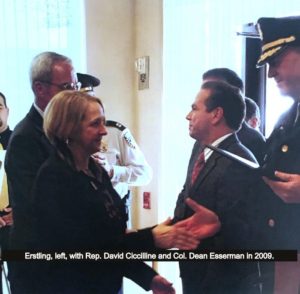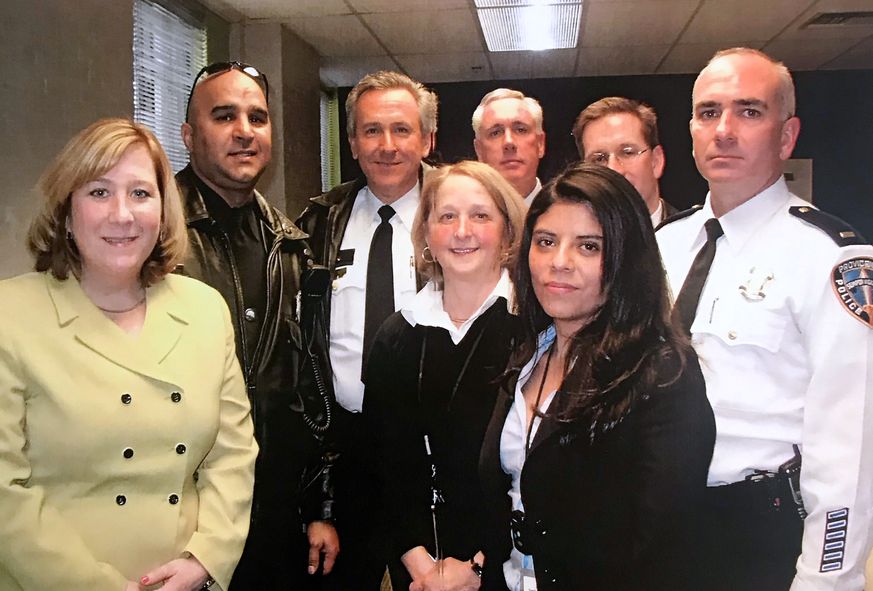In emergency situations, there are two types of people – those who hesitate and those that dash in – with all the passion and empathy they can muster.
Dr. Susan Erstling is the latter. Back in 2004, Erstling developed the Go Team police partnership at Family Service of Rhode Island to have social workers go out on patrol along with the police, through a groundbreaking partnership.
The “[Go Team] was probably so attractive to me because I came from a family of first responders and was quite used to sirens going off in the middle of the night,” said Erstling.

Erstling, now a member of FSRI’s Board of Directors, first came to Family Service of Rhode Island (FSRI) in 2004 to help implement a partnership between law enforcement and social workers for the organization’s new Go Team. Modeled after the Yale Child Study Center’s police-clinician response to children exposed to violence, Go Team sought to address stress, anxiety, depression, and other symptoms of trauma through police and clinician intervention. Erstling, who had experience in family therapy and community mental health, brought her expertise to FSRI and worked with others to bring this initiative to life.
“Being exposed to violence– such as the murder of a parent, ongoing domestic violence, death of a sibling, human trafficking, and home invasions– make it hard for children to focus in school, or for parents to focus fully on children’s needs,” Erstling said.
It’s a model for policing that’s getting more attention today than ever before, despite the fact that federal funding for this kind of work has been seriously cut in recent years.
“It seems like right now police community relations are fraying. This type of program enhances both the law enforcement side as well as the community needs. It is built on collaboration, partnership, access to services and all the good things that both our professions bring to the table,” Erstling said.
Since the Go Team has no natural funding streams, constant advocacy is necessary to keep the program functioning. The initiative’s focus on the traumatic effect of exposure to violence has allowed FSRI to collaborate with other organizations. Some of this significant work includes teaching victim impact classes in prisons and working with Hasbro Children’s Hospital. Being in the forefront of local and national trauma services demonstrates FSRI’s consistent community impact.
The “[Go Team] has had an impact on thousands of children and families who have been exposed to traumatic events that normally would derail them from their healthy functioning,” Erstling said.
The program’s success heavily relies on the partnership between officers and clinicians who ride together and respond to calls. Bonding allows individuals to learn about each other and develop a trusting relationship. When officers arrive at a scene, having a clinician present to assist families in ways that the officer may not have time for or is trained to handle is imperative in constructively addressing trauma. This partnership not only alleviates an officer’s workload but also brings peace of mind from the confidence in their clinician’s ability to address the often painful and complicated issues that families face.
Between 2004 and today, Erstling has witnessed the Go Team’s exponential growth – beginning with the Providence Police and expanding to the State Police, East Providence, Central Falls, and Pawtucket police. Community members in need of immediate emotional and social support readily receive assistance from police officers and clinicians who assist victims and guide them to additional services. The initiative partnership has generated other dynamic programs and has developed the organization’s excellence in both trauma work and evidence-based practices.
The previous experience and expertise clinicians bring on the scene help families better navigate their options of helpful, needed resources and their potential ongoing mental, emotional, and physical abuse. As a proactive support system, the team also follows up with individuals to ensure they are receiving effective care.
Actively using resources to confront trauma reduces long-term effects and helps people recover sooner. Additionally, by following up with victims, clinicians and police officers create meaningful relationships that make families more willing to contact the police for future issues.
The Go Team is also continuously evolving and bettering its program. Police officers now include FSRI responders in sergeant classes, department recruitments, and new officer trainings. Officers also take a more effective trauma perspective in understanding victims because of the learned experience they have with the Go Team. Instead of looking at individuals and saying, “what’s wrong with them,” officers are alternatively saying “what has happened to them.” For instance, a child who brings a knife or gun to school may traditionally be viewed as a criminal. This action, however, buds from constant bullying and tormenting, so looking for ways to protect the child from harmful encounters helps them escape the factors that have led to their legal issues.
Go Team workers put their hearts into their jobs, and their kindness repeatedly shows itself through their actions. From an officer collecting money to buying a bike for a disabled child whose bike was stolen to responders going to court with a victim to offer support and courage, FSRI’s Go Team goes above and beyond to uplift and care for its families.
The program’s success has not gone unnoticed. Other police departments have asked for the Go Team model, and clients’ follow-up surveys have produced extremely positive remarks over the years. As the initiative moves into its eighteenth year of service, recent funding cuts put stress on the program.
The Go Team’s influence throughout Rhode Island has assisted thousands of community members. By quickly responding to victims’ needs, the program continues to make a notable difference. Thanks to the Go Team’s existence, the passionate police officers and clinicians who respond to together to calls are better equipped to effectively address traumatic situations as a team.
To learn about FSRI’s Go Team and how you can help, please visit familyserviceri.org.
